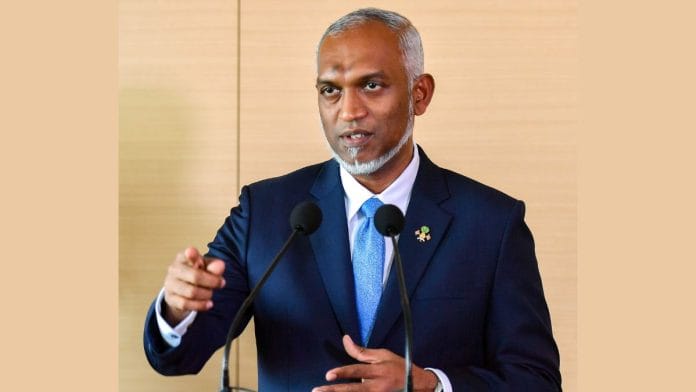New Delhi: Maldivian President Mohammed Muizzu’s coalition has swept the parliamentary elections in the country, getting a “supermajority” that will enable the pro-China leader to easily pass bills in a Parliament that was previously dominated by the opposition.
Preliminary results show that Muizzu’s ruling alliance — comprising the Progressive Party of Maldives (PPM) and People’s National Congress (PNC) — bagged over 60 seats out of a total of 93 in the People’s Majlis.
However, this outcome was largely unexpected by the opposition Maldivian Democratic Party (MDP), which is led by former president and Muizzu’s predecessor, Ibrahim Mohamed Solih. The MDP won a landslide victory in 2019, another “supermajority” in Maldivian political parlance, by bagging 65 seats. It is now expected to get just 10.
The complete reversal of power in the Majlis will give the Muizzu government political stability for the next five years. Muizzu, who won the presidential elections last September, has faced difficulty passing bills in parliament, the most recent case being the skirmish over setting a date for the elections.
While Muizzu wanted the election to be held before Ramadan, the MDP was keen on polls being held after the Muslim holy month. The MDP-dominated parliament ultimately pushed a bill for the latter date.
‘Unexpected’ outcome
Sources in the Maldivian opposition told ThePrint that this large a defeat for the opposition was unexpected when many had predicted a hung parliament.
“It is a surprise since a lot of people had predicted a hung parliament this time. MDP was expected to do better. Even the (Muizzu) government didn’t expect to win this huge super majority,” former vice president Ahmed Adeeb, who is from the Maldives Third Way Democrats party, told ThePrint.
The MDP was the first party to come to power without a coalition in 2019 since a democratic government was established in the country in 2008.
But this election, the MDP has been far behind in several races.
They have been trumped by independent candidates, for one. For example, in Hithaadhoo Dhaaira, Independent candidate Ikuleel Shareef was just 48 votes behind the PNC’s candidate, Mohamed Siruhaan. Shareef was second in the race, ahead of MDP candidate, Ayathulla Hussain.
Independents secured six seats, a development to be watched, said Indian analyst and commentator N. Sathiya Moorthy, as some may end up joining Muizzu’s coalition. In certain constituencies, independent nominees put up a good fight against their PNC and MDP rivals.
The Democrats, formed by former Maldivian president Mohamed Nasheed, did not secure a single seat despite enjoying a handful of seats in the previously-held polls.
Also read: Maldives minister who was suspended for mocking Modi takes another swipe at India, then apologises
What it means for India and China
The parliamentary elections in Maldives have been keenly watched by observers India and China as the two countries have been vying for influence in the archipelago.Reacting to the results, China’s foreign ministry spokesperson Wang Wenbin reportedly said Monday that Beijing was willing to work with Male to “maintain traditional friendship” and “expand exchanges and cooperation in various fields”.
The Indian government is yet to officially react.
Muizzu, who won the Maldivian presidency last year after leading an ‘India Out’ campaign, has been tough on New Delhi by pushing for the removal of Indian military troops from his country and refusing to renew an agreement that allows India to conduct hydrographic surveys in Maldivian waters.
Meanwhile, he has leaned closer to China, making Beijing his first official state visit since assuming the presidency during which the two countries upgraded ties and inked over 20 agreements.
According to Sathiya Moorthy, who serves as Senior Fellow at the Observer Research Foundation (ORF), the results aren’t all that rosy for China.
“On the face of it, it is a morale-booster for China. But will Muizzu continue in the same vein after he has now trounced (former President Abdulla) Yameen with his ‘India Out’ campaign, which had bothered him, is a serious question Beijing should be asking itself,” Sathiya Moorthy told ThePrint.
He added as far as India was concerned, the results indicated “ensured political stability” for another five years under the Muizzu government.
“India can work on bilateral strengths and weaknesses, one by one. Whatever major damage that Muizzu could inflict on India, rather on bilateral relations, he has already rushed through. It cannot get worse, prima facie, and can only hope to get better, slowly but surely,” he added.
According to Adeeb, the Muizzu government now has an opportunity to balance its foreign policy.
“The government can now make new decisions on their own since they are not bound by Yameen’s agenda of an anti-India campaign nor is it bound to China completely. It has an opportunity to balance its foreign policy. There should be a focus on managing the debt of Maldives and making development a high priority,” Adeeb told ThePrint.
Yameen, who began the ‘India-Out’ campaign in Maldives, couldn’t contest last year’s presidential elections as he faced an 11-year jail term for corruption. Four days ago, he was acquitted and freed.
(Edited by Tikli Basu)
Also read: Muizzu’s tactics change as Maldives seeks debt relief from India, now ‘closest ally’






